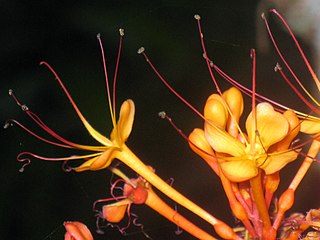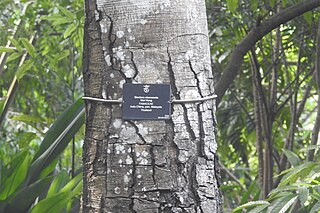
Saraca asoca, commonly known as the ashoka tree, is a plant belonging to the Detarioideae subfamily of the Fabaceae family of plants.

Saraca L. is a genus of flowering plants in the family Fabaceae of about 20 plant species of trees native to the lands from India and Sri Lanka to Indochina, southern China Malesia, and New Guinea.

Erythrina lysistemon is a species of deciduous tree in the pea family, Fabaceae. It is native to South Africa. Common names include common coral-tree, lucky bean tree, umsintsi (Xhosa), muvhale (Venda), mophete (Tswana), koraalboom of kanniedood (Afrikaans), mokhungwane (Sotho) and mutiti (Shona). It is regularly cultivated as a tree for gardens and parks.
Angylocalyx talbotii is a species of flowering plant in the family Fabaceae. It is found in Cameroon and Nigeria. Its natural habitat is subtropical or tropical moist lowland forests. It is threatened by habitat loss.

Sindora siamensis is a species of tree in the subfamily Detarioideae of the family Fabaceae. It has an accepted infraspecific, the variety S. siamensis var. maritima (Pierre) K.Larsen & S.S.Larsen. See taxon box to the right below, and below for details on the variety maritima. The nominate species is found in many countries in tropical Asia. Like several other species in the genus Sindora, its wood is considered valuable; the least concern conservation status may reflect efforts to replant this species, but mortality rates are high. As well as the wood, the plant provides raw material for chemical products, food and drink, and domestic utensils.
Ficus luschnathiana is a species of plant in the family Moraceae. It is found in Argentina, Brazil, Bolivia, Paraguay, and Uruguay.
Knema glaucescens is a species of plant in the family Myristicaceae. It is native to Sumatra, Peninsular Malaysia, Singapore and Borneo. However, a morpho-taxonomic study of fossil leaves assemblage discovered from the upper part of the Siwalik succession of sediments of Papum Pare district, Arunachal Pradesh, India, had shape, base and venation pattern comparable to Knema glaucescens (Myristicaceae).
Saurauia bogoriensis is a species of plant in the family Actinidiaceae. It is a tree endemic to Java in Indonesia. It is a critically endangered species threatened by habitat loss.
Saurauia mahmudii is a species of plant in the family Actinidiaceae. It is a tree endemic to Peninsular Malaysia. It is threatened by habitat loss.
Saurauia malayana is a species of plant in the family Actinidiaceae. It is a tree endemic to Peninsular Malaysia. It is threatened by habitat loss.
Saurauia pentapetala is a species of plant in the Actinidiaceae family. It is found in Malaysia and Thailand.

Chaenomeles cathayensis is a species of flowering plant in the rose family, Rosaceae. It is native to China, Bhutan, and Myanmar. In Chinese, its common name is mùguā hǎitáng (木瓜海棠) or máo yè mùguā (毛葉木瓜).

Dipterocarpus obtusifolius is a common species of tree in the family Dipterocarpaceae found throughout Southeast Asia, including Andaman Islands, Myanmar, Thailand, Cambodia, Laos and Vietnam.

Olinia emarginata, the mountain hard pear or berghardepeer in Afrikaans language, is a tree species in the family Penaeaceae. It is native to South Africa and Lesotho.

Phaleria capitata is a species of flowering plant in the family Thymelaeaceae. It grows as a shrub or small tree up to 10 metres (30 ft) tall, with a stem diameter of up to 15 centimetres (6 in). Twigs are reddish brown. Inflorescences usually bear five flowers. The fruits are roundish, up to 1.5 cm (1 in) long. Habitat is forest from sea-level to 1,200 metres (3,900 ft) altitude. P. capitata grows naturally in Sri Lanka, Peninsular Malaysia, Sumatra, Borneo, Sulawesi, Maluku, the Philippines, New Guinea, the Caroline Islands and Tonga.
Mangifera quadrifida is a species of plant in the family Anacardiaceae. It is a tree native to Peninsular Malaysia, Sumatra and Borneo.

Rhodamnia cinerea is a rainforest tree of Southeast Asia, in the family Myrtaceae.

Gardenia erubescens is a species of shrub or small tree in the family Rubiaceae. It has edible fruits and occurs in the Guinea and Sudan savannah vegetation of West and Central Africa.
Paranomus reflexus, the Van Staden's scepter, is a flower-bearing shrub that belongs to the family Proteaceae. It is part of the South African fynbos vegetation type. The plant is native to the Eastern Cape where it occurs on the Elandsberg and Van Stadensberg.

Paranomus tomentosus, the hairy-leaf tree sceptre, is a flower-bearing shrub that belongs to the genus Proteaceae. It is part of the South African fynbos vegetation type. The plant is native to the Western Cape, South Africa.













